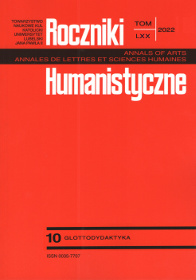Barngarla—an Australian Aboriginal Language on the Crowdsourcing Educational Platform LARA
Abstract
The aim of this paper is to present some didactic materials designed to learn Barngarla, which is an Australian Aboriginal language. Barngarla represents the Thura-Yura group of languages that is part of the largest Australian Aboriginal language family—Pama-Nyungan—which comprises about 300 languages in total. Barngarla died out in the 1960s, but as of 2012 measures have been undertaken by researchers from the University of Adelaide to revitalise the language. The language is spoken by a small community inhabiting the Eyre Peninsula in South Australia. The teaching materials designed to revitalise the language are partially available on the crowdsourcing educational platform LARA (Language and Reading Assistant), devoted to language teaching through reading.
References
Akhlaghi, Elham, i in. „Demonstration of LARA: A Learning and Reading Assistant”. SLaTE 2019: 8th ISCA Workshop on Speech and Language Technology in Education 20-21 September 2019, Graz, Austria, www.isca-speech.org/archive/SLaTE_2019/pdfs/SLaTE_2019_paper_06.pdf. Dostęp 11.04.2021.
Austin, Peter K. „Language Documentation and Language Revitalization”. Revitalizing Endangered Languages: A Practical Guide, red. Justyna Olka, i Julia Sallibank, Cambridge University Press, 2020, ss. 119-211.
Austin, Peter K., i Julia Sallabank, redaktorzy. „Welcome!” Endangerous Languages. Cambridge University Press, 2011, ss. 1-6.
Brabham, Deren C. Crowdsourcing. MIT Press, 2017.
Butterweck, Matt, i in. „Easy Construction of Multimedia Online Language Textbooks and Linguistics Papers with LARA”. ICERI 2019, Seville, Spain, November 11-13, 2019, www.unige.ch/ callector/files/9115/7305/3445/ICERI_linguistics_final.pdf. Dostęp 24.11.2021.
Clendon, Mark. Clamor Schürmann’s Barngarla Grammar: A Commentary on the First Section of “A Vocabulary of the Parnkalla language”. University of Adelaide Press, 2018.
Dorian, Nancy C. „Purism vs. Compromise in Language Revitalization and Language Revival”. Language in Society, t. 23, nr 3, 1994, ss. 479-494.
Estellés, Enrique, i Fernando González. „Towards and Integrated Definition of Crowdsourcing”. Journal of Information Science, t. 38, nr 2, 2012, ss. 189-200.
Habibi, Hanieh. „LARA Portal: A Tool for Teachers to Develop Interactive Text Context, an Environment for Students to Improve Reading Skills”. International Conference of Education, Research and Innovation, Seville, Spain, 11–13 November 2019, www.unige.ch/callector/ files/6615/7305/3474/LARA_PORTAL.pdf. Dostęp 12.04.2021.
Haig, Geoffrey L. J., i in. „Introduction”. Documenting Endangered Languages: Achievements and Perspectives, red. Geoffrey L. J. Haig, Nicole Nau, Stefan Schnell, Claudia Wegener. De Gruyter Mouton, 2011, ss. 1-16.
Hercus, Louise. A Grammar of the Wirangu Language from the West Coast of South Australia. Pacific Linguistics C-150, 1999.
Himmelmann, Nikolaus P. „Documentary and Descriptive Linguistics”. Linguistics, t. 36, 1988, ss. 161-95.
Hinton, Leanne, i in. „Introduction. Language Revitalization as a Growing Field of Study and Practice”. The Routledge Handbook of Language Revitalization, red. Leanne Hinton, Leena Huss, Gerald Roche, Routledge, Taylor & Francis Group, 2018, ss. xxi-xxx.
Howe, Jeff. „The Rise of Crowdsourcing”. Wired Magazine, 14(6), 2006, ss. 1-4.
Jiang, Yuchao, i in. A Review on Crowdsourcing for Education: State of the Art of Literature and Practice. PACIS 2018 Proceedings. 180. aisel.aisnet.org/pacis2018/180. Dostęp 12.04.2021.
„Language Documentation and Language Revitalization: Some Methodological Considerations”. The Routledge Handbook of Language Revitalization, red. Leanna Hinton, Leena Huss, i Gerald Roche, Routledge, 2018, ss. 207-15.
Olko, Justyna, i Julia Sallabank. Revitalizing Endangered Languages: A Practical Guide. Cambridge University Press, 2020.
Ostler, Nicholas. „Language Maintenance, Shift, and Endangerment”. The Cambridge Handbook of Sociolinguistics, red. Rajend Mesthrie, Cambridge University Press, 2011, ss. 315-44.
Prester, Julian, i in. „Crowdsourcing for Education: Literature Review, Conceptual Framework, and Research Agenda”. Proceedings of the 27th European Conference on Information Systems (ECIS), Stockholm & Uppsala, Sweden, June 8-14, 2019, aisel.aisnet.org/ecis2019_rp/114. Dostęp 12.04.2021.
Rayner, Manny, i in. „Constructing LARA Content”. www.issco.unige.ch/en/research/projects/ callector/LARADoc/build/html/index.html. Dostęp 20.06. 2021.
Schürmann, Clamor. A Vocabulary of the Parnkalla Language Spoken by the Natives Inhabiting the Western Shores of Spencer’s Gulf, to which is Prefixed a Collection of Grammatical Rules, Hitherto Ascertained. Adelaide: George Dehane, 1844.
Simpson, Jane. „Making Sense of the Words in Old Wordlists”. Paper and Talk: a Manual for Reconstituting Materials in Australian Indigenous Languages from Historical Sources, red. Nicholas Thieberger, Aboriginal Studies Press, 2005, ss. 121-45.
Simson, Jane, i Luise Hercus. „Thura-Yura as a Subgroup”. Australian Languages: Classification and the Comparative Method, red. Claire Bowern i Harold Koch, John Benjamins, 2004, ss. 207-22.
Surowiecki, James. The Wisdom of Crowds. Random House, 2004.
Tunbridge, Dorothy. „Affixes of Motion and Direction in Adnyamathanha”. Complex Sentence Constructions in Australian Languages, red. Paul Austin, John Benjamins, 1988, ss. 267-83.
Zuckermann, Ghil’ad. Dictionary of the Barngarla Aboriginal Language of Eyre Peninsula, South Australia, 2018, www.dictionary.barngarla.org/. Dostęp 16.06.2021.
Zuckermann, Ghil’ad. Revivalistics: From the Genesis of Israeli to Language Reclamation in Australia and Beyond. Oxford University Press, 2020.
Zuckermann, Ghil’ad, i Rob Amery. Language Revival: Securing the Future of Endangered Languages. EdX, 2015.
Zuckermann, Ghil’ad, i Barngarla. Barngarlidhi Manoo. E-book. „Speaking Barngarla Together”, 2019, część 1: www.barngarlalanguage.com/dictionary. Dostęp 24.07.2021; część 2: www.adelaide.edu.au/directory/ghilad.zuckermann?dsn=directory.file;field=data;id=41096;m=view. Dostęp 24.07.2021.
Zuckermann, Ghil’ad i Barngarla. Mangiri: „Barngarla Wellbeing”. W przygotowaniu.
Zuckermann, Ghil’ad, i in. „LARA in the Service of Revivalistics and Documentary Linguistics: Community Engagement and Endangered Languages”.” ComputEL 2021 Proceedings of the 4th Workshop on the Use of Computational Methods in the Study of Endangered Languages, online, March 2–3, 2021. T. 1, ss. 13-23, www.unige.ch/callector/files/1216/1700/1508/ 2021.computel-1.3.pdf. Dostęp 24.07.2021.
Zuckermann, Ghil’ad, i in. „Native Tongue Title: Compensation for the Loss Aboriginal Languages”. Australian Aboriginal Studies, t. 1, 2014, ss. 55-71.
Zuckermann, Ghil’ad i Michael Walsh. „Stop, Revive, Survive: Lessons from the Hebrew Revival Applicable to the Reclamation, Maintenance and Empowerment of Aboriginal Languages and Cultures”. Australian Journal of Linguistics, t. 31, nr 1, 2011, ss. 111-27.
Copyright (c) 2022 Roczniki Humanistyczne

This work is licensed under a Creative Commons Attribution-NonCommercial-NoDerivatives 4.0 International License.





